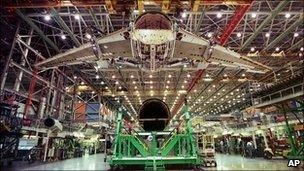US economic growth slows, says Federal Reserve
- Published

Excluding orders for transportation equipment, durable goods orders increased slightly
US economic growth has slowed in recent weeks due to ongoing troubles in the housing and labour markets, a report from the Federal Reserve suggests.
"Economic activity continued to grow; however, the pace has moderated in many districts," the Fed said in its influential Beige Book.
Earlier, figures showed new orders for US big manufactured goods fell in June.
Together with ongoing concerns about the US debt ceiling, the figures helped push US markets sharply lower.
The main Dow Jones index fell 199 points, or 1.6%, to 12,303, dragging European markets down with it.
US lawmakers are currently at a stand-off in negotiations to raise the government debt ceiling.
Consumer spending
The Fed said residential property activity was "little changed and remained weak", while employment conditions "remained soft".
Severe flooding and droughts had also hit the agriculture sector, it said.
However, the Fed did say that consumer spending and manufacturing activity had increased overall.
The Beige Book, compiled eight times a year and used to help set interest rates, is based on a survey of business views from around the US.
Orders slump
Earlier, figures showed that new orders for US manufactured goods fell in June due to a sharp drop in transport equipment and, in particular, civil aircraft.
Orders for so-called durable goods fell by $4bn (£2.4bn) or 2.1% to $192bn in the month, the Commerce Department said.
An 8.5% or $4.2bn fall in transport goods orders accounted for the drop.
Orders for commercial aircraft and parts slumped by almost 30%, while those for defence planes and parts fell 20%.
Excluding transport, new orders rose by 1%.
June is the second month in the past three months that durable goods orders have fallen, with analysts pointing to the disruption in supply chains caused by March's earthquake and tsunami in Japan as one cause.
Uncertainty over the outlook for the US economy is another, they say.
"We're getting confirmation that this is more than just a soft patch in the first part of the year, that it's a more fundamental slowdown triggered in part by the political environment and jittery markets," said Michelle Meyer at Bank of America Merrill Lynch.